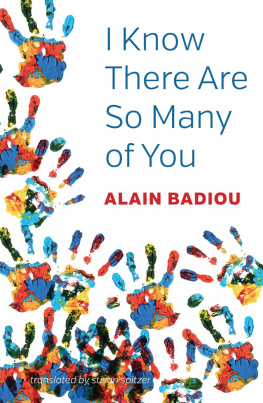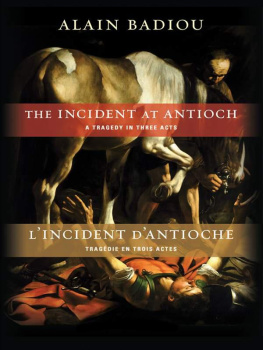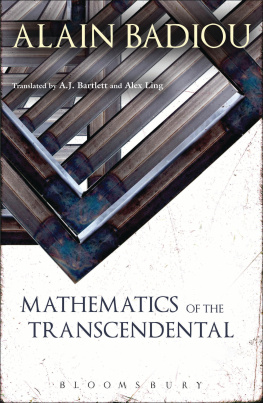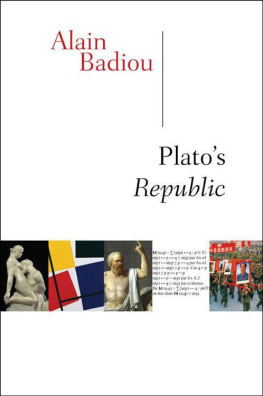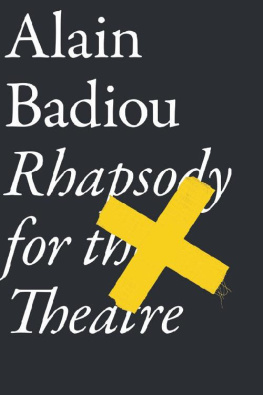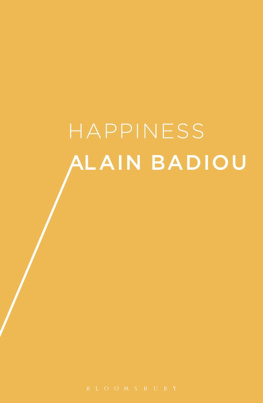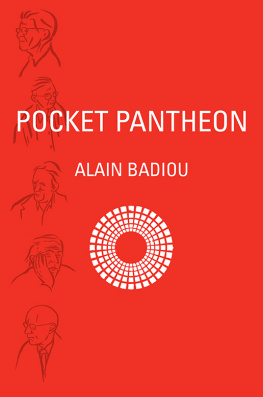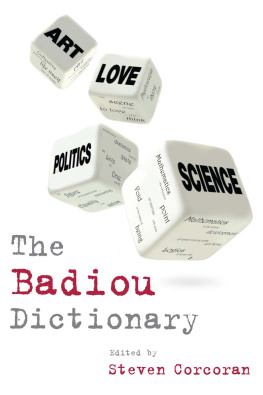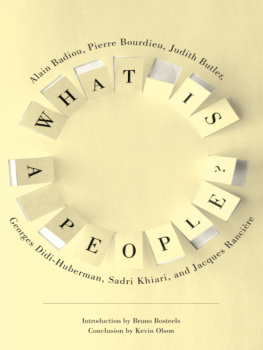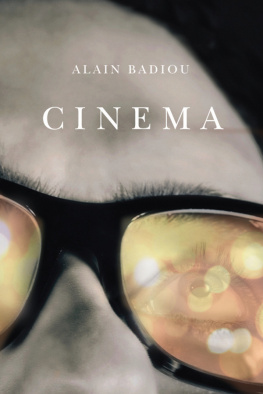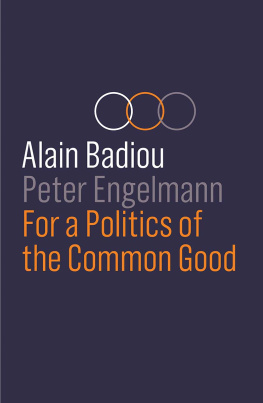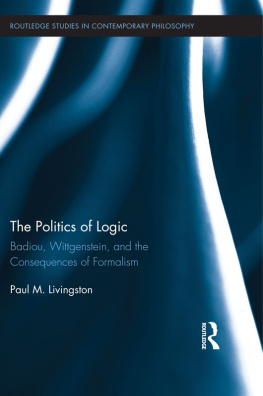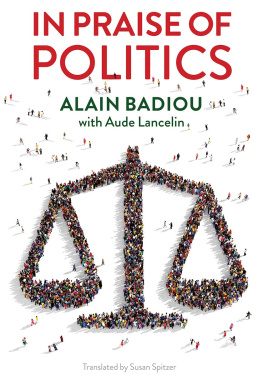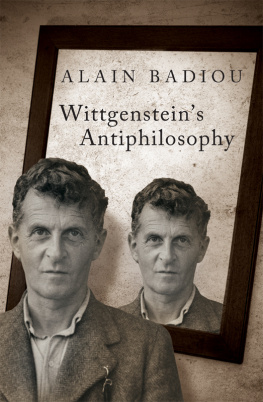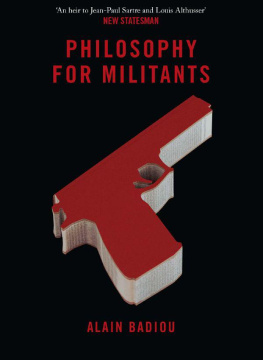Alain Badiou
Translated by Susan Spitzer
polity
First published in French as Je vous sais si nombreux... Librairie Arthme Fayard, 2017
This English edition Polity Press, 2019
Polity Press
65 Bridge Street
Cambridge CB2 1UR, UK
Polity Press
101 Station Landing
Suite 300
Medford, MA 02155, USA
All rights reserved. Except for the quotation of short passages for the purpose of criticism and review, no part of this publication may be reproduced, stored in a retrieval system or transmitted, in any form or by any means, electronic, mechanical, photocopying, recording or otherwise, without the prior permission of the publisher.
ISBN-13: 978-1-5095-3262-9
A catalogue record for this book is available from the British Library.
Library of Congress Cataloging-in-Publication Data
Names: Badiou, Alain, author.
Title: I know there are so many of you / Alain Badiou.
Other titles: Je vous sais si nombreux. English.
Description: Cambridge, UK; Medford, MA: Polity Press, 2018. | Includes bibliographical references and index.
Identifiers: LCCN 2018004916 (print) | LCCN 2018020846 (ebook) | ISBN 9781509532629 (Epub) | ISBN 9781509532599 (hardback) | ISBN 9781509532605 (pbk.)
Subjects: LCSH: Humanity--Philosophy. | Humanism. | Other (Philosophy) | Young adults--Political activity. | Political science--Philosophy.
Classification: LCC BJ1533.H9 (ebook) | LCC BJ1533.H9 B3413 2018 (print) | DDC 194--dc23
LC record available at https://lccn.loc.gov/2018004916
The publisher has used its best endeavors to ensure that the URLs for external websites referred to in this book are correct and active at the time of going to press. However, the publisher has no responsibility for the websites and can make no guarantee that a site will remain live or that the content is or will remain appropriate.
Every effort has been made to trace all copyright holders, but if any have been inadvertently overlooked the publisher will be pleased to include any necessary credits in any subsequent reprint or edition.
For further information on Polity, visit our website: politybooks.com
Preface
The two essays that make up this volume began as two lectures I delivered, the first at the Lyce Henri-IV and the second at the cole nationale des Beaux-Arts. A common feature of both was that they were addressed to audiences composed predominantly of young people, although for different reasons. At the high school the reason was obvious, since there are not many old people still in high school. At Beaux-Arts it was a different story, because it didnt involve students from that school, at least not primarily, but rather a very informal organization of young and not-so-young people, almost all of whom were from the recent, closely related mass movements, the Nuit Debout [Night on Our Feet] gathering on the Place de la Rpublique and the fight against the labor law devised by the final Valls-Hollande government. They met regularly at Beaux-Arts to assess their action and to plan for the future. The organization was called Consquences, which is a good name.
I owed my presence as a speaker to the mediation and requests of two young friends of mine, each of whom was from one of the places concerned and who basically represented for me the appeal to young people of philosophy primarily, in the one case, and of politics primarily, in the other.
In both cases there was a full house, an audience listening intently, and intense discussion afterward.
The key concept of the first lecture was the Other and of the second one, politics. Youll see fairly quickly, I believe, that there were subtle, close links between the two requests. Basically, the situation very naturally turned the two lectures into a kind of sequel to my recently published book La vraie vie [published in English as The True Life, Polity, 2017], which was itself based for the most part on lectures to high-school students.
So once again it was a case, as the Athenian citizens characterization of Socrates public speeches had it, of corrupting the youth, which means: offering them some possibility, if not of changing the world, at least of having a strong enough desire to see what that could be like.
Alain Badiou
The Other
Thank you for this large turnout. Its a pleasure for me to be here in this famous establishment and to speak to so many of those I once resembled, even though I was at Louis-le-Grand. Im only mentioning the old rivalry between Lyce Henri-IV and Lyce Louis-le-Grand because Ive managed to get over it, since, as you can see, Im speaking here at Henri-IV.
Id like to begin with some banalities. But essential banalities, of the kind that must never be forgotten. There are some things that are perfectly ordinary and banal, but, for just this reason, they are forgotten, and the forgetting causes damage to sophisticated or fundamental thought. So, since we are going to be talking about the Other, Id like to start with some banalities about the Same. Indeed, Im going to start with a very basic materialist definition of what we all are, namely, members of a well-defined animal species, the human species. This is a very recent species, actually, from the perspective of the overall history of life on our little, insignificant planet. At any rate no more than 200,000 years old, at the most, whereas the existence of living beings on Earth is measured in hundreds of millions of years.
What are the most general characteristics of this recent species?
As you know, the biological criterion of a species, including our own, is that the mating of a male and a female of the species can produce fertile offspring. Now, this obviously happens frequently where the human species is concerned, regardless of the color, the geographical origin, the size, the ideas, or the social organization of the partners. Thats the first point.
Furthermore and this is the second point the human lifespan, another material criterion, seems unable for the time being to exceed 130 years at the most. All this you know. But it already allows us to make two comments, which, while very simple, are, I believe, fundamental.
The first is that the cosmic adventure, so to speak, of the human species, of the human animal, is actually short. This is a hard thing to imagine because, for us, 200,000 years is already something thats lost in thick mists, especially in comparison with the paltry one-hundred-some-odd years by which our individual life adventure is strictly bounded. Nevertheless, we must still remember this platitude: compared to the overall history of life, the period of existence of the species Homo sapiens (thats what we rather pretentiously call ourselves) is a very short, unique adventure. It could therefore be argued that we may be only just beginning, that we may be at the very beginning of this unique adventure. This is so as to establish a time scale for the things that can be said and thought about humanitys collective becoming. The dinosaurs, for example, were not very appealing, at least by our standards, but they existed over a truly enormous time scale as compared with our species. That scale is measured not in thousands of years but in hundreds of millions. Humanity as we know it can imagine itself as a sort of scant beginning. But the beginning of what? That will be one of the issues well explore.
The second comment is that there is an undeniable material level, of a biological nature that of the reproduction of the species, of sexuation, of birth on which it has been more or less proven that were all the same. Were all the same, perhaps, on this one level alone. But on this level that exists and is materially fixed. And then theres the issue of death, which occurs within more or less fixed temporal parameters.

